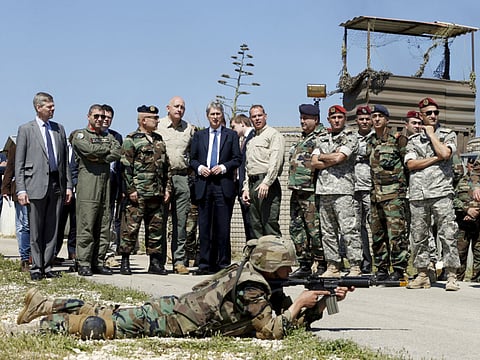Aid packages reaffirm importance of Lebanese army
After Saudi Arabia suspended its $4b aid several countries are stepping up to fill existing gaps

Beirut: Although Saudi Arabia suspended its $4 billion security aid packages on February 22 because Beirut failed to condemn attacks on Saudi diplomatic missions in Iran, both the US and the UK stepped up to the plate this week to fulfill earlier pledges to the Lebanese Armed Forces (LAF).
On Thursday, Washington delivered three UH-1H Huey II helicopters to the government of Lebanon in a contract estimated at $26 million that is part of an order for 18 Hueys approved by the US Department of State in September 2014. These troop transport and support helicopters have been pressed into service by Lebanon as bombers, which is why they are fitted with extended undercarriage skids and improvised bomb racks for the delivery of 250 kg (550 lb) and 400 kg (880 lb) weapons.
Simultaneously, London boosted its aid too—worth about $29 million—to assist the LAF in various border detection and warfare systems. The British Foreign Secretary Philip Hammond made this key reinforcement in person, as he visited Beirut and pledged an additional $6.5 million to help train more than 5,000 LAF soldiers. “Lebanon is an important part of the frontline against terrorism,” he told journalists after meeting Lebanese Prime Minister Tammam Salam, which send a clear message to one and all.
In fact, his message, which was repeated by the US Charge d’Affaires and interim ambassador, Richard H. Jones, during the helicopters delivery ceremony, highlighted a fundamental principle. Both the US and the UK perceived the legitimate government of Lebanon, despite its current woes, as the only partner worthy of support. As a result of Hezbollah’s continued fighting in Syria, which both the US and the UK regretted, Beirut was caught in an existential dilemma, one that pitted the vulnerable country against powerful regional foes. Everyone agreed that the country needed serious military assistance from its allies, including Saudi Arabia, whose aid many hoped would be granted after the political doldrums are resolved and anti-Arab leaders removed from power.
In the meantime, several countries are stepping up to fill existing gaps, in a state ravaged by a 15-years-long civil war, Israeli and Syrian occupations, and the continued presence of a foreign-backed private militia, Hezbollah, with superior firepower.
The US alone provided over a billion dollars in military assistance during the past decade, and supplied the LAF with a wide range of equipment from ammunition to armored vehicles, and is adding tanks, mini-UAVs, and even patrol boats to that list. Britain increased its assistance too, along with Germany (whose vital high-tech border crossing machines helped the LAF) and France, which engaged on selected transfers although it was unclear whether Paris would continue now that Riyadh suspended the financial packages that were supposed to pay for the French equipment. It was unclear whether President Francois Hollande, expected to visit Beirut around mid-April, would authorize fresh weapon tranfers.
Sign up for the Daily Briefing
Get the latest news and updates straight to your inbox



